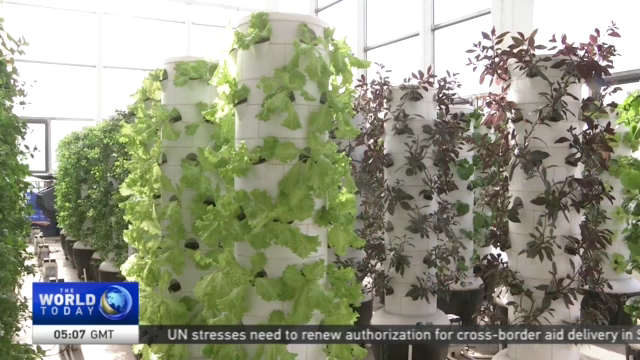
14:14, 30-Nov-2018
Sustainable Food Future: Tech-based agriculture grows in China, addresses rising urban demand
Updated
13:57, 03-Dec-2018
03:16

In the next 15 years, over 200 million Chinese are expected to move from rural into urban and suburban environments. This will greatly reduce the labor force on China's arable lands which some say calls for a revolution in farming methods for sustainable food production. CGTN's Feng Yilei digs into the trend.
An appetite for clean, fresh greens -- like a bowl of salad -- grows with the burgeoning population in Chinese cities and towns. But feeding the rising demand faces challenges, with farmers among those moving from the countryside to the city. Scarce land, water and a lack of manpower are pushing food producers to find a way out.
DR. WEI LINGLING, RESEARCHER CHINESE ACADEMY OF AGRICULTURAL SCIENCES "The main task of controlled environmental agriculture is to get the most output with the least resources at the highest efficiency. We use technology like AI and the Internet of Things to precisely control production."
In suburban Beijing, plant factories built with innovative techniques incorporate farming into urban growth. On a small plot of indoor space, plants are rooted on layered shelves vertically, and bathe in light continuously during the day. Sensors linked to automatic irrigation and temperature control systems provide optimal conditions for growing. Planned production means -- higher yield, resource-wise, space optimization, and labor saving.
DR. WEI LINGLING, RESEARCHER CHINESE ACADEMY OF AGRICULTURAL SCIENCES "Controlled environment technologies will be more accurate in the future to better balance cultivation and environment with less energy consumption. And in this closed production system, we circulate water and fertilizer to cut emissions, and improve sustainability of agriculture."
FENG YILEI BEIJING "Back to the salad tomatoes, this time in the field, the results of using these leading technologies is rather fruitful. Many believe this industrialized and intelligent way of farming will gradually replace extensive farming, which relies heavily on manual work and land usage for mass production."
But to move on to the next stage, ordinary Chinese may have to accept certain changes in their daily lives. For individual farmers that own the country's hundreds of millions of small plots, some have temporarily transferred their leaseholds to these high-tech farms and are getting used to their new roles.
WANG XIANGANG VILLAGER "I get paid for my land and for working on this farm as an employee. I don't make much but it's stable. I no longer worry about natural disasters and I'm learning about organic farming."
And when conditions are ripe - will consumers be ready to pay a higher price for the products?
"I think I would, when they're healthier and much nutritious, especially for the elderly and children."
Experts say the public will recognize the value of these crops as awareness of food safety and environmental stewardship rises. And once the demand rises, more players are expected to use tech-based food production, which will drive down prices. Feng Yilei, CGTN, Beijing.

SITEMAP
Copyright © 2018 CGTN. Beijing ICP prepared NO.16065310-3
Copyright © 2018 CGTN. Beijing ICP prepared NO.16065310-3